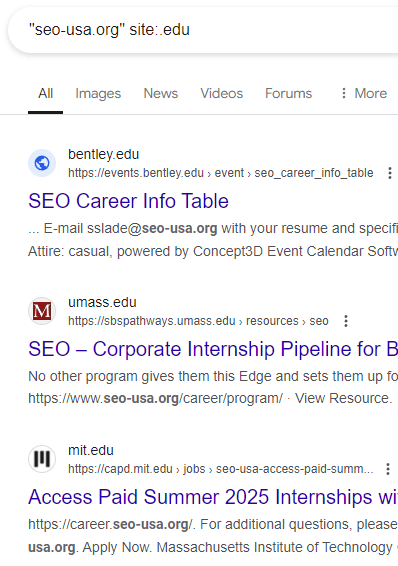Something Weird Is Going On In Google’s SERPs

People are always complaining that there’s something wrong with Google’s search results but what’s going on with search results for queries with the acronym “SEO” is in a class by itself and has to be seen to be believed.
Anomalies In Search Results
An anomaly is something that deviates from the norm or what’s expected. A lot of time when there’s something wrong with the search engine results pages (SERPs) the anomaly is explainable. For example, queries that combine a geographical element with a relatively longtail phrase tend to generate weird results. Another driver of strange search results is when there simply isn’t enough data about a specific combination of words, which sometimes leads to offensive search results.
What’s happening with a particular group of keyword phrases that are related to the word “SEO ” is not any of those kinds of anomalies. It’s a true anomaly.
Here are the keywords that Google is (arguably) getting wrong:
- SEO program
- What is an SEO program?
- SEO New York (City)
- SEO NYC
- SEO Conference
- SEO Events
- SEO Education
- SEO Awards
- SEO-USA.Org
The site that’s ranking for all those SEO search queries (and probably more) is a site called SEO-USA.org. The acronym SEO in that website stands for Sponsors for Educational Opportunity. It’s not a spam site, it’s a legit non-profit website that’s been around since 1963. The purpose of the non-profit is to provide mentorship to young people who are underserved to help them get into colleges and universities. That program evolved in the SEO Scholars, an eight year academic program for talented young people to help them through high school and college.
“SEO Scholars creates a more equitable society by closing the academic opportunity gap for motivated young people, setting the standard for academics, mentorship, community, peer-to-peer support, and a powerful, lifelong network.”
SEO-USA.org Is Not Relevant For SEO
The acronym SEO is heavily relevant for the context of online marketing. A search for “SEO” in Google spawns suggestions that are all relevant for SEO in the sense of search marketing.
Google Trends shows that the phrase SEO Scholars and SEO Scholars Application are not widely searched in the United States, most of the searches occur in New York. But SEO-USA.org is top ranked for the group of keywords listed above in other areas outside of New York.
Screenshot Of SERPs For Keyword Phrase “SEO Awards”

It’s kind of obvious that SEO-USA.org is not relevant for the most commonly understood meaning for the acronym SEO.
Could Backlinks Be The Reason?
It’s possible that the reason SEO-USA.org is ranking for all of those phrases is because of backlinks. A search for the domain name but restricted to .edu sites shows almost seventy .edu websites that link to the the SEO-USA.org domain name.
This is the advanced search that shows scores of .edu sites that link or mention SEO-USA.org:
"seo-usa.org" site:.edu"
Screenshot Of Site:.EDU Search

There are also a large amount of high quality sites with dot org domains that link to SEO-USA.org as well, which is observable using the following advanced search:
"seo-usa.org" site:.org -site:seo-usa.org"
On the surface it looks clear that backlinks are the reason why SEO-USA.org ranks for irrelevant keywords.
But of course, the most obvious answer isn’t always the right answer. There’s more to the picture.
Why Links Probably Don’t Explain The Rankings
If links were the reason for SEO-USA.org’s rankings then it would follow that virtually every keyword phrase related to SEO would be littered with .edu and .org websites but that’s not the case.
I’ve been doing SEO for about 25 years now and I remember the days when sites that had the maximum level of PageRank used to rank for virtually anything. Also, dot edu links were regarded as powerful because SEOs were able to rank quite well with them.
Google’s algorithms improved and the effect from .edu links started to wane because context of a link started counting more. The words in the title element and the words in the surrounding text influenced the links. I know this too from my experience.
Another important change in Google’s link ranking algorithms was to dampen the effect of quantity of links. It used to be that an avalanche of links was enough to help a site rank over more authoritative sites. I know this from my experience too.
But the effect of a huge amount of links also changed in many ways, like hundreds of links from one domain stopped counting as hundreds of links and began counting as just one link. The position of a link within a page also mattered more, there were lots of changes that whittled down the power of links so that less and less links mattered for the wrong reasons.
I’m kind of skeptical that links is the reason why SEO-USA.org ranks.
What’s The Answer?
For some reason, a relevance factor is not kicking in, which allows the (arguably) irrelevant SEO-USA.org site to rank for keywords it probably shouldn’t rank for.
I think that’s a clue, a reason for why that site is ranking where it should not. It’s slipping through because something is missing that would ordinarily be there to keep it out.
It may very well be that there’s a factor related to trustworthiness that is allowing that site to slip through. That’s just speculation. Do you have any ideas?
Featured Image by Shutterstock/SS 360
Source link : Searchenginejournal.com


![YMYL Websites: SEO & EEAT Tips [Lumar Podcast] YMYL Websites: SEO & EEAT Tips [Lumar Podcast]](https://www.lumar.io/wp-content/uploads/2024/11/thumb-Lumar-HFD-Podcast-Episode-6-YMYL-Websites-SEO-EEAT-blue-1024x503.png)
